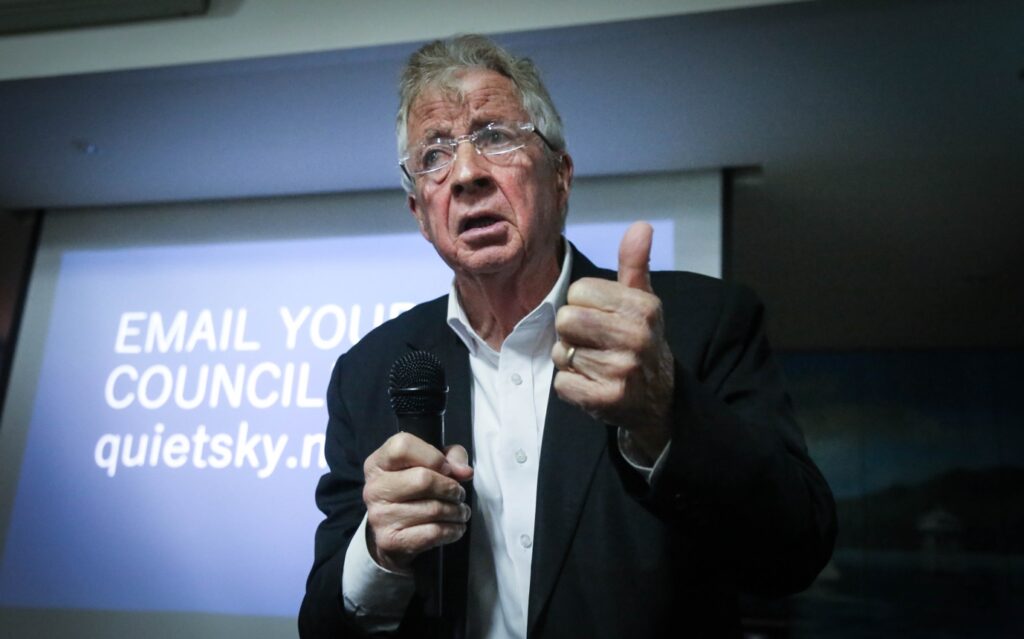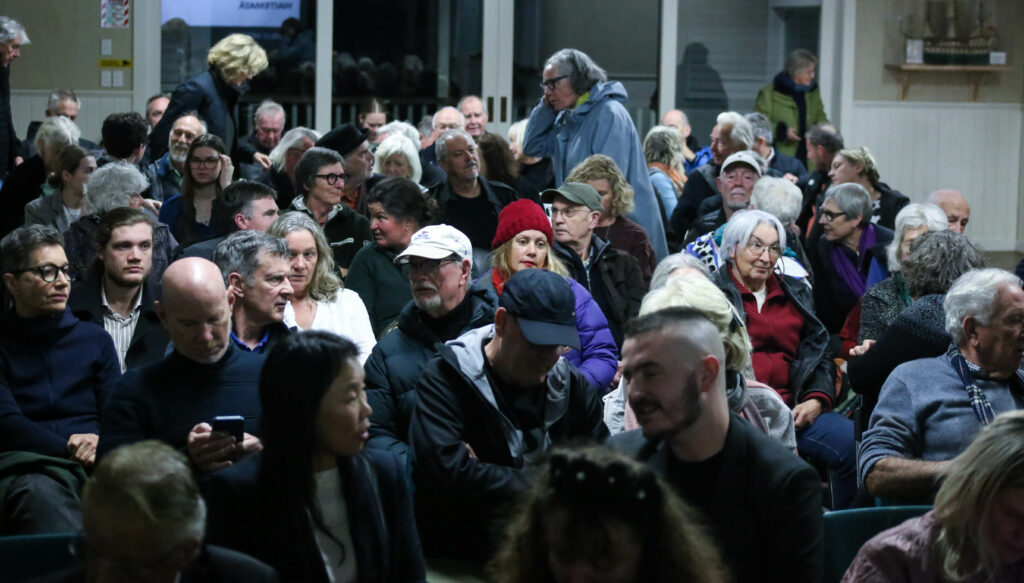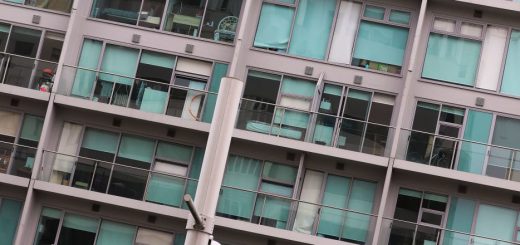High Noon for helipads
Helipads and their ear-shattering impacts on neighbours have become highly controversial in recent years, especially so in this ward. The issue was brought to a head once agaIn by the now rather notorious proposed helipad at 38 Rawene Avenue, Westmere. In a 5-day consent hearing, Quiet Sky Waitematā, its legal counsel and expert witnesses, Herne Bay Residents Association (HBRA), and 1306 residents (87% of all submissions) argued strongly against. Not surprisingly, the shock decision by council’s independent hearing commission to approve the consent sparked an uproar.
Commission chair Kit Littlejohn’s arguments justifying the decision has driven a legal truck-bomb into the middle of the Auckland Unitary Plan, with potential major implications – and not just for helipads.’

Addressing the meeting in July at Cox’s Bay organised by Quiet Sky Waitematā
The Littlejohn decision – Auckland Council’s ‘own goal’
Council planners maintain that under the Auckland Unitary Plan, helipads in residential areas, are a ‘non-complying’ activity (expensive to obtain consent but by no means impossible). But their handpicked hearing panel disagreed, ruling that helipads are a permitted activity based on the bizarre logic that helicopter transport is an ‘inherently residential’ activity – just like the family car.
Deeply embarrassed at the prospect of a helipad free-for-all, council planners want to return to the status quo ante but legally they can’t appeal the council’s own decision.
For this rather scrambled egg on their faces, council planners only have themselves to blame. Leaving aside the decision which implies they don’t understand their own Unitary Plan, it must be asked, given Mr Littlejohn was a barrister for a previous Herne Bay helicopter application, why was he selected for such a contentious hearing in the first place?
Somewhat ironically council is being helped out of its fix it got itself into by Quiet Sky which has appealed the decision to the Environment Court.
Auckland – ‘an international outlier ‘
Public tolerance for this shambles has now reached its limits. Auckland Council has consented more private helipads in the Waitematā & Gulf ward than anywhere else in the country. In the Gulf islands, due to planning rules that are even more permissive, Waiheke has now 65 helipads with one in the pipeline, Great Barrier 12, while Herne Bay/ Westmere have 4 (counting the latest).
In allowing private helipads in residential areas Auckland Council is an international outlier. In most cities, for example Sydney, these are prohibited in residential and business areas. Landing aircraft in residential areas is not only terribly intrusive for the neighbours its also potentially dangerous,’
Since I was re-elected in 2022, I have been trying to change this, foreshadowing my intentions at the first planning committee meeting in December 2022. The following March I succeeded in winning an amendment tasking planners to report back on budgeting for a plan change prohibiting helipads in residential areas.
Late that December, planning staff came back armed with a consultant’s report (not it should be noted, from a retired judge, nor a planning professor, but from an acoustics consultant!) arguing that ‘prohibited activity status was ‘undesirable’ and ‘near impossible to achieve’. This was nonsense of course, completely ignoring the Court of Appeal’s landmark ruling on prohibited activity in 2007.
The planners’ consultant’s report didn’t impress the three affected local boards either, Aotea Great Barrier, Waiheke and Waitematā, all of which responded by unanimously supporting prohibited activity. So in March 2024, so with Cr Kerrin Leoni seconding, proposed a notice of motion for plan changes to both the Unitary Plan and the Hauraki Gulf District Plan making helipads in residential/settlement areas in the city and on Waiheke and Great Barrier a prohibited activity. It lost by 8 votes to 10.

In a cold ,stormy mid July night, local residents crowded inot the Hawke Scout Hall at Cox’s Bay for a meeting organised by Quiet Sky Watematā to support Mike L:ee’s Notice of Motion to make helipads a prohibited activity in residential areas.
High Noon for helipads – the showdown at the Policy & Planning Commitee
This July, I split the notice of motion into two, one for the city, one for the Gulf. This had the support of a packed meeting of residents in Cox’s Bay and a petition of 4196 names, both organised by Quiet Sky Waitemata with the support of Herne Bay Residents Association – and all three local boards. At the 24 July, Planning & Policy Committee, after a protracted debate, dominated by council planning staff deeply invested in the status quo, an ambush motion from the committee chair Richard Hill, effectively blocked voting on the notice of motion. The 220 word ‘motion-by-way of replacement’ did include a reference (albeit token) to ‘targeted prohibited activity’ but essentially it supported management’s preferred status quo. However there was problem.
Despite its official sounding title, there is no such thing as a ‘amendment-by-way of replacement’ in council’s Standing Orders. The nearest equivalent is a ‘Subsituted Motion’ (section 1.5.5.) However in order for that to proceed it must have the consent of the mover and seconder of the original motion and that was neither given nor even sought. The committee chair Richard Hill, and council management are so determined to prevent helipads being prohibited they resorted to breaching the council’s own standing orders to make up the rules to suit themselves. What sort of governance is that?’
A formal complaint has been laid by Cr Lee and Cr Leoni with the council chief executive Phil Wilson and the matter is proceeding.
Fortunately I thought to split the motion into two, as the second one, to prohibit helipads in residential/settlement areas of Waiheke and Great Barrier succeeded, carried by 14 votes to 7. So not a complete victory but by no means a defeat either’
Despite this ‘stitch up’, the council planners’ taboo against ‘prohibited activity’ has been broken.This battle for the fundamental right of people for the quiet enjoyment of their homes and properties will go on, until we win.



